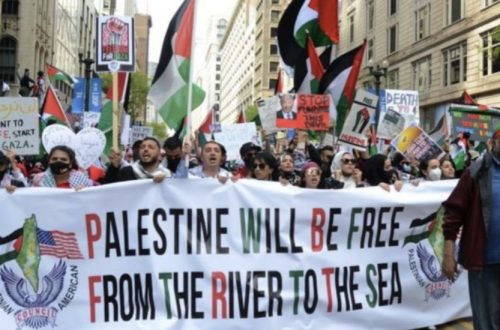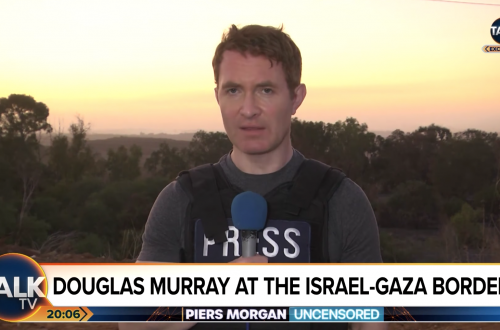This is a cross-post by Futile Democracy
I’ve been writing on this blog for several years now, and every now and again I’ll be asked “why do you focus so much on….” The question is usually followed by “Islam?“, “Christianity?“, “God, even though you don’t believe in Him?“, “The GOP?“, “Tories?“. And for the most part, those people are right. It’s not a big selection of issues that I tend to focus on. I am selective. I focus on religion, because I’m a secular atheist interested and critical of all things religion. I focus on the US Republicans, because I find their shift to the far right to have created an intriguing atmosphere in US domestic politics. I focus on the Tory Party, because, well, I don’t like them. It’s that simple. I am selective. But I’m clear in my motives and my prejudices and on such issues that don’t have a clear right or wrong, I expect a lot of disagreement from others.
In Owen Jones’s latest article for The Guardian on the rise anti-semitism, I tended to agree with much of what he wrote, but some of it I found to be more excuses for his own recent motives. He was correct when he points out that during the protests, a section of the Western right-wing attempted to paint all of those attending, as anti-Semites, which completely dilutes the term ‘anti-semitic’. It was a hideous misrepresentation of many well meaning people with genuine concerns and a wish to see the end of immense human suffering in Gaza. Where Owen slips up, is in his characterisation of the criticisms that I and others have regarding the selective outrage of sections of the Western left. Owen writes:
“The response of many supporters of Israel’s attack has been instructive. In a world where there is so much injustice and bloodshed, they say, why not march against the sectarian murderers of Islamic State (Isis) or Boko Haram? This is known as “whataboutery”: an attempt to deflect from one injustice by referring to the suffering of others. Some defenders of Israel’s governments believe the supposed special attention received by the conflict is itself evidence of antisemitism. But Israel’s atrocities attract this attention because the state is armed to the teeth and backed by western governments, rendering them directly complicit; IS and Boko Haram, on the other hand, are (quite rightly) opposed by our rulers. Demonstrations and protests are generally a means of exercising influence over supposedly democratically accountable governments.”
– This paragraph highlights my point throughout this debate entirely. It’s probably worth noting that taking issue with Owen’s selective outrage does not make one a “supporter of Israel’s attack” nor a “defender of Israel’s government“. To subtly hint at such, is as ridiculous as suggesting that criticism of Israeli policy, comes from “supporters of Hamas“. It is not worth dignifying with a full retort.
Next, the entire paragraph is irrelevant in an article on the rise of anti-Semitism, there is no reason to include it, and so I suspect the entire article was written as a response to the criticisms Jones has faced in recent weeks. (Mehdi Hasan attempted a similar excuse, which I wrote on here.) It also fails, because whilst he’s correct that demonstrations and protests are a means of exercising influence over a government, there’s no reason – nor precedent – for protests being solely connected to whom the UK/US/West funds and/or arms. The conclusion to his paragraph therefore, does not follow from his overall argument. Protests against the Sri Lankan Civil War urged world leaders to push Sri Lanka to declare ceasefire. Their motivation wasn’t that the UK had grotesquely sold almost £14mn in arms to Sri Lanka in the recent years of the conflict (that knowledge came later), it was a concern for human rights and a possible genocide. The Global Day of Action for Burma did not include in its demands any reference to funding being the sole justification for their protest, and instead focused on raising awareness and working to pressure governments of the World into taking action. The ‘Stop Kony’ fad of 2012 – whilst it didn’t achieve its key goal, and was doubtless a fashionable fad for many rather than a protest – did achieve significant goals. It raised awareness, leading to Human Rights Watch saying:
“We’ve spent years investigating the horrors perpetrated by the LRA in central Africa – Uganda, Democratic Republic of Congo, Central African Republic (CAR), and South Sudan. We gathered evidence at massacre sites – wooden clubs covered in dried blood, rubber strips from bicycle tires used to tie up the victims, and freshly dug graves – and spoke to hundreds of boys and girls forced to fight for his army or held captive as sex slaves. And we’re elated that #stopKony is a trending topic on Twitter – if anyone deserves global notoriety it’s Kony.”
– It also led to Senators Jim Inhofe and Chris Coons raising the issue in the US Senate and pledging the US’s support for governments in Africa trying to track down leaders of the LRA. It led to United Nations High Commissioner for Refugees noting an unprecedented reaction to the atrocities and new commitments to stop the LRA. To a large extent, it worked. Mobilising, protesting, using the power of social media, and all forms of pressure do not require first analysing the financial transactions of the UK. Which leads me to point two:
I am not keen on this new excuse that amounts to a sort “we don’t fund them, so we’re not that fussed” reaction. This is not how the international left traditionally went about its business, and as seen with prior protests, has not been a major theme. It didn’t strike off the list all of those human rights abusing nations or groups that weren’t receiving Western aid. It wasn’t a primary concern, and I’m not sure why it is now. It is also a badly crafted excuse and I don’t buy it as the real motive. Pakistan is one of the biggest recipients of bilateral aid, with a large chunk from the UK, despite Pakistan’s violent grip on Balochistan, to no protests whatsoever from the Western Left. The US funded the gangland regime in Honduras for years, which in turn created a brewing humanitarian crisis on the US/Mexico border with very little registering on the US Left. Afghanistan with its awful Shia Family Law, corruption within the PA, Congo, Jordan, the list goes on, and the murderous, oppressive regimes receive little protest from the left. It is a self-evidently weak excuse, and still fails to do its job, because the selective outrage is still applied inconsistently. Those conflicts may involve the US to a degree (when isolated from all other context), but they don’t directly involve Israel, so the outrage may be limited to a few words of condemnation, in perhaps a Tweet or two about how it’s all the US’s fault. I would also argue that this inconsistency and a tendency to single out Israel under a daily microscope, whilst making excuses for that, has fuelled the rise of the very anti-semitism Jones now rightly argues against.
Thirdly, my criticism is not that Owen and others like him are selective in their outrage. We all do that. I do that. Whether on foreign issues like Gaza, or domestic issues like the Bedroom Tax, we’re all selective and we all have our motives for being selective. Being selective is not a negative in itself. It would be ridiculous of anyone to demand we register equal protest and outrage at every conflict in every part of the World on every single day. That appears to be what Owen believes we’re doing, but it simply isn’t the criticism I have. I am clear with my criticism, and it is based on motive. Motive drives us all in how we select, and that is no different for that particular section of the Left. My criticism is that there is a significant section of the Left that increasingly selects its moral outrage and how it chooses to protest, on the basis of whether or not the crisis and the victims can be used as a vehicle to progress a rabid anti-US/UK/Blair/Israel sentiment. Through this, I am frustrated by their rewriting of history to filter out surrounding context, by underplaying the contribution to the crisis from figures other than the US/UK/Israel, by sharing images that do not show what they purport to show, and articles that are far less than accurate and cannot be dismissed as simple oversight. The motive is not primarily concern for victims (though I don’t doubt that concern for victims plays its part, I’m not suggesting Owen’s section of the Left lacks empathy), nor is it the traditional Left’s motive of fighting oppression where ever it is found. It is the cynical use of conflicts, to progress the underlying narrative of anti-US/Israel/West, that forms the bases of my criticisms.
When such a dogmatic motive for a very narrow narrative lies just beneath the surface, it may not be formed through conscious bigotry, but it manifests itself in simplistic analysis, and manipulative rhetoric that perpetuates bigotry (see Galloway’s recent comments). As previously mentioned, Mo Ansar played to that crowd when working to underplay the devastation caused by Hamas rocket fire. This is also evident in Owen’s past articles. For example, in his article entitled “Why the left must speak up about the persecution of Christians” – a noble fight – it doesn’t take Owen long to simplistically blame the US and UK, betraying the original point of the article:
“It is, unsurprisingly, the Middle East where the situation for Christians has dramatically deteriorated in recent years. One of the legacies of the invasion of Iraq has been the purging of a Christian community that has lived there for up to two millennia.”
– Yup. It’s the West’s fault. For the rest of us, it is the ‘legacy’ of a plethora of causes, that to an extent includes the incompetent conducting of and the aftermath of the invasion, the sectarian and disuniting policies of Maliki’s government, but those are given their strength by religious turmoil for centuries including the massacre of Assyrian Christians in the 1930s, private funding for groups like ISIS from donors elsewhere, Saddam’s relocation of Christians away from strategic resources and an emphasis on the notion that Christians are to be ‘tolerated’ in those areas, rather than considered equal. It is not simply ‘legacy of invasion, blame the US’. The problems are rooted far deeper. The context far wider.
When it came to the crisis with the self-titled ‘Islamic State’ – ISIS – in Iraq, the focus for Jones was another overly simplistic analysis, in which surrounding context can just be dismissed, in a quest to blame the US/UK. This time, the self-serving motive was less subtle: “We anti-war protestors were right; the Iraq invasion has led to bloody chaos”. It’s almost as if there wasn’t bloody chaos – a couple of genocides, nothing to see here – prior to the Iraq invasion. In his incredibly reductive analysis, Jones chooses to ignore the Iraq that Saddam left behind devoid of any semblance of democratic institutions, a massive Syrian civil war, ignore the Arab Spring, ignore a power play between Saudi Arabia – seeking to weaken Maliki whilst also opposing Jihadists at home – and Iran in Iraq & Syria, ignore what seems to be support for anti-Shia groups in Syria from private donors in Qatar and Saudi Arabia, ignore a largely heavy handed Shi’ite security force in Iraq, ignore the fight for a resurrected Caliphate from extreme elements within Islam for decades (it’s difficult to blame Blair for the popularity of al-Nabhani’s ideas and the strength of Hizb in the 1980s/90s across the globe), ignore centuries of sectarianism (including Saddam’s hideous massacre of around 100,000 Shi’ite Muslims in and around Karbala and al-Najaf a year before Blair took over as leader of Labour), ignores al-Maliki’s sectarian governance, ignores a weak Iraqi constitution, ignores the tensions between ISIS and Jabhat al-Nusra. All surrounding context is filtered out, because it doesn’t indicate a line directly from Blair to ISIS.
So, we can discount the ‘we fund them’ excuse, because it doesn’t seem to extend far beyond Israel, and still leaves us with the same criticism of the motives for selection. We can discount the ‘we protest to pressure the government’ because that is the case with most protest movements regardless of whether or not we fund the culprits. We can discount the ‘whataboutery’ complaint, because it isn’t the criticism we actually have in the first place. My conclusion remains the same; there is a purpose in working to oversimplify conflicts in the manner that the Galloway-left often does. Being selective is not the issue. The motive is the issue. In this case, ‘being selective’ is focused entirely on how a crisis can be used to progress an anti-US/Israel narrative. Manipulated and reductive history, dismissal of all surrounding context, blatantly false or emotive images and information, and awful excuses, are all utilised to that end. And I’m fine with that motive, if only they’d admit it, because at the moment it gives the rest of us on the Left a bad name.


